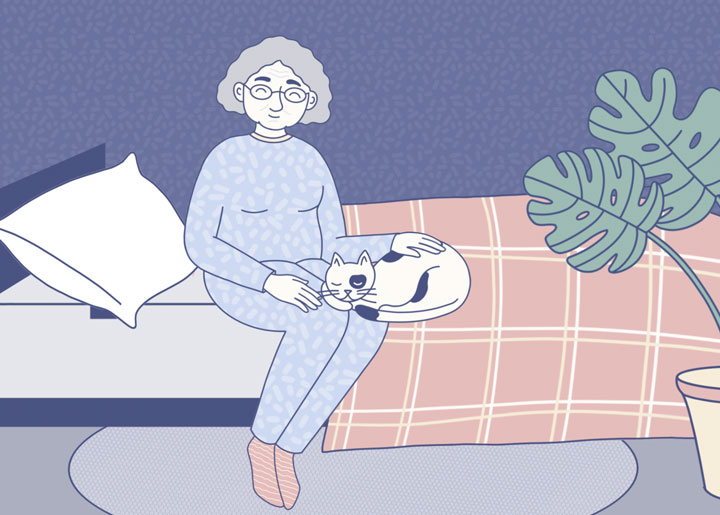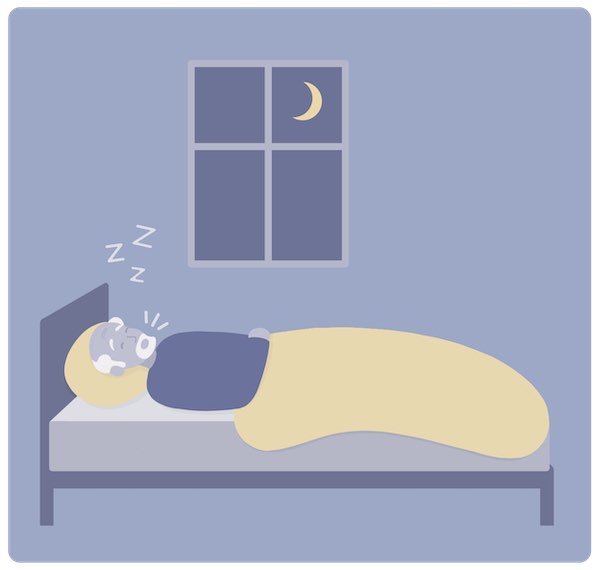Alzheimer’s disease affects the brain in a number of ways, potentially impacting everything from mood to memory to everyday behavior. As such, it should come as no surprise that patients who have Alzheimer’s often experience difficulty sleeping soundly through the night, or else they experience significant disruptions to their regular sleep schedule. This can present some challenges to the Alzheimer’s patient as well as to their caregivers, who may find it hard to adapt to these sleep abnormalities.
A good place to start is by developing a clearer understanding of the link between Alzheimer’s and sleep.
Sundowning
One of the primary reasons why Alzheimer’s patients tend to struggle with sleep is that they experience a phenomenon known as sundowning. Sundowning refers to the common condition in which individuals with Alzheimer’s (or other forms of dementia) become increasingly agitated, confused, or anxious, typically right around dusk. This level of disorientation may continue for a few hours or even through the nighttime, making it very difficult for the patient to feel settled in their bed.
What causes those with Alzheimer’s to experience sundowning, exactly? Researchers aren’t entirely sure, though many potential factors have been suggested. Some of the most likely reasons for sundowning include:
- Following a long day navigating strange or unfamiliar environments, Alzheimer’s patients are physically exhausted and mentally fatigued.
- Alzheimer’s disease causes the patient’s internal body clock to become out-of-sync, meaning they start ramping up rather than winding down at the end of the day.
Alzheimer’s patients may also experience disorientation due to their difficulty separating dreams from reality. - One final note is that caregivers are often rather tired themselves at the end of the day. Their non-verbal communication may inadvertently convey stress, fatigue, or frustration, which feeds into the Alzheimer’s patient’s sense of agitation.
Other Sleep Problems Associated With Alzheimer’s
Sundowning is a common cause of sleep disruption among patients with Alzheimer’s, but it’s hardly the only sleep-related symptom to be associated with dementia. Those with Alzheimer’s may also experience any of the following:
Restless Leg Syndrome
Those who have restless leg syndrome (RLS) experience a tingling or crawling sensation in their legs, making it very difficult for them to remain still or to get comfortable. This can naturally make it more challenging to settle in for a good night’s sleep. Studies have shown that RLS can have significant consequences. Specifically, the lack of sound sleep may result in chronic insomnia, depression, and anxiety. Scientists believe that many Alzheimer’s patients also have RLS, though determining the exact link can be challenging. The main reason for this is that RLS is typically a self-reported condition, and those with any form of dementia may be unable to describe their experience.
Sleep Apnea
Millions of Americans suffer from sleep apnea. This potentially life-threatening condition causes the patient to temporarily stop breathing throughout the night. It can lead to daytime drowsiness and fatigue, as the brain is never quite able to go into the deep-sleep state that it needs. Researchers have long seen a link between dementia and sleep apnea, with plenty of studies suggesting that those with Alzheimer’s have an increased risk for the sleep disorder. While the specific link remains unclear, it has been suggested that a buildup of tau proteins may be a marker both for Alzheimer’s and for sleep apnea.
Insomnia
According to the Alzheimer’s Association, those with Alzheimer’s tend to “wake up more often and stay awake longer during the night.” Indeed, brain wave studies have shown that those with Alzheimer’s tend to see a decrease in both their dreaming and non-dreaming sleep states. This sleeplessness can turn into daytime drowsiness and fatigue. And, because it makes daytime napping more likely, it can become a vicious cycle, making it harder for the patient to fall asleep when night comes. Finally, because those with Alzheimer’s are more likely to get up and wander or call out, their insomnia can also prove disruptive for caregivers.
The Relationship Between Alzheimer’s And Sleep Deprivation
We have already seen that those with Alzheimer’s experience many possible disruptions to their sleep. However, the inverse can also be true: Chronic or sustained sleep deprivation can lead to a heightened risk for Alzheimer’s.
According to one study, missing out on even a single night’s sleep can lead to an increase in beta-amyloid— a protein that’s commonly associated with impaired brain function, and ultimately with the onset of Alzheimer’s.
Specifically, those who have Alzheimer’s tend to experience clusters of beta-amyloid, which get between the neurons and impede them from proper communication. And while the specific causes for beta-amyloid buildup remain a little fuzzy, there is mounting evidence that sleep deprivation plays a leading role. Though not totally conclusive, this growing body of research points to a new understanding of the pathology of Alzheimer’s, particularly its connection to sleeplessness.
Tips For Getting A Better Night’s Sleep
While sleep disruptions are all too common among Alzheimer’s patients, the good news is that there are practical tips and strategies that can improve the quality of sleep among patients and caregivers alike.
To begin with, here are a few tips for caring for someone who is experiencing sundowning:
- Provide plenty of lighting. Expose the patient to natural light throughout the day, which can help keep circadian rhymes in check. And when it starts getting dark outside, try to keep the home well-lit, which can minimize confusion or uncertainty.
- Reduce clutter and noise in the room. Sundowning can often result from overstimulation. One important thing caregivers can do is to keep the patient’s physical environment as clean and as calming as can be.
- Encourage exercise throughout the day. Physical activity throughout the day can help prepare the body and the mind for sleep. Encourage regular activities such as walks through the neighborhood.
Some additional, more generalized sleep tips for seniors include:
- Consider a CPAP for sleep apnea. If you believe sleep apnea is part of the problem, talk with a doctor about getting a CPAP machine. These devices can help promote more consistent breathing, and thus minimize sleep disruptions.
- Treat RLS. There are some simple, home remedies that can be attempted for RLS symptoms. To minimize that “crawling” feeling in the extremities, consider a warm bath or even a soothing massage.
- Try to keep a consistent sleep schedule. Consistency can go a long way toward preventing insomnia. Set wake-up and bedtimes matter; and, when possible, it’s best to avoid napping during the day.
Last Word From Mattress Clarity
Living with Alzheimer’s, or caring for someone with the disease, comes with countless disruptions. Often, these disruptions include sleep impairment, which can in turn make the symptoms of Alzheimer’s worsen. While there is not yet a cure for Alzheimer’s, there are at least some strategies that can promote sleep, and bolster overall quality of life.

